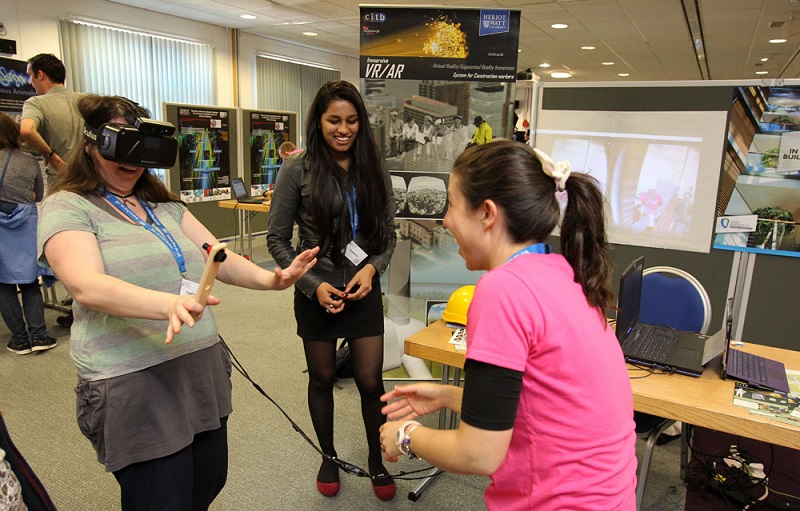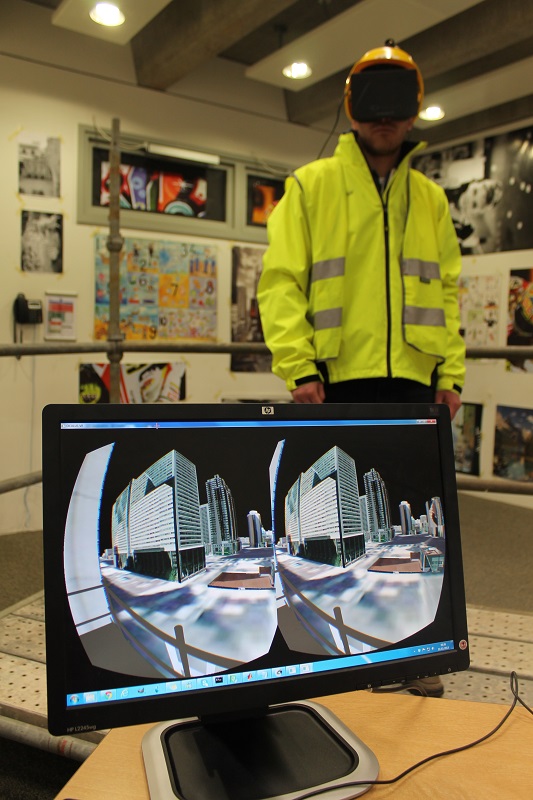Immersive Hybrid Reality iHR
Experts in construction and computer technology at Heriot-Watt University have developed a ground-breaking immersive hybrid reality (iHR) system which aims to take the danger out of extreme working conditions. The system enables users to experience work activities within realistic site conditions, such as working at extreme height, without facing real health and safety risks.
The iHR system, which is funded by the Construction Industry Training Board (CITB), uses state-of-the-art wearable computer systems and a specially-modified virtual reality (VR) headset to enable trainees to see, navigate and interact with real and virtual objects in a realistic working environment.
The iHR recently won a CIOB highly commended Innovation Award in the Innovation in Education and Training category.
The iHR system is hosted at Edinburgh College. The Energy Skills Partnership (ESP) and Fife College are also investing in an iHR pilot system for wind turbine training, in collaboration with the Offshore Renewable Energy Catapult. The pilot project mimics inspections on the top of wind turbines.
Dr Mohamed Abdel-Wahab from Heriot-Watt University said:
“The combination of real and virtual worlds provides trainees with a vivid, yet safe and realistic, experience of a jobsite. The iHR system could support the delivery of training in many areas of the energy, engineering and construction sectors. Indeed the application of iHR can enhance the quality of training provision.”
Dr Frédéric Bosché said:
“The system also delivered additional benefits in terms of engaging young people in STEM subjects in general, and energy, engineering and construction in particular. The team has developed a mobile version of the system (called MobiHR), that we have used to support our partner colleges in numerous Skills and Careers Fairs. Young people are excited about such new technologies, but would never associate them to industries like Construction that are often seen as anchored in old traditions, “not cool”. At those events, we believe our system helps inspire young people.
“From a technical viewpoint, our system delivers what we have called 'hybrid reality'. We use this term to differentiate its functionality from Augmented Reality (AR). In AR, the virtual content is always on top of the real views. In HR, the 3D structure of both worlds are accurately captured and merged so that if the user aims to put their hand beneath a virtual table, it will actually appear beneath the table (i.e. occluded by the table). Furthermore, the user can actually interact with virtual 3D objects. Traditional AR technology cannot deliver this.”
[edit] Related articles on Designing Buildings
- 3D MOVE: Mobile Immersive Visualisation Environment.
- Assisted reality aR.
- Augmented reality in construction.
- Building information modelling.
- Construction drones.
- Digital Built Britain.
- Gravity Sketch.
- Integrated modelling, simulation and visualisation (MSV) for sustainable built healing environments (BHEs).
- Integrated systems.
- The Palimpsest.
- TruVision.
- Virtual reality and manufacturing.
- Virtual reality in construction.
- Visualisation.
- Wearable technology.
Featured articles and news
Apprenticeships and the responsibility we share
Perspectives from the CIOB President as National Apprentice Week comes to a close.
The first line of defence against rain, wind and snow.
Building Safety recap January, 2026
What we missed at the end of last year, and at the start of this...
National Apprenticeship Week 2026, 9-15 Feb
Shining a light on the positive impacts for businesses, their apprentices and the wider economy alike.
Applications and benefits of acoustic flooring
From commercial to retail.
From solid to sprung and ribbed to raised.
Strengthening industry collaboration in Hong Kong
Hong Kong Institute of Construction and The Chartered Institute of Building sign Memorandum of Understanding.
A detailed description from the experts at Cornish Lime.
IHBC planning for growth with corporate plan development
Grow with the Institute by volunteering and CP25 consultation.
Connecting ambition and action for designers and specifiers.
Electrical skills gap deepens as apprenticeship starts fall despite surging demand says ECA.
Built environment bodies deepen joint action on EDI
B.E.Inclusive initiative agree next phase of joint equity, diversity and inclusion (EDI) action plan.
Recognising culture as key to sustainable economic growth
Creative UK Provocation paper: Culture as Growth Infrastructure.
Futurebuild and UK Construction Week London Unite
Creating the UK’s Built Environment Super Event and over 25 other key partnerships.
Welsh and Scottish 2026 elections
Manifestos for the built environment for upcoming same May day elections.
Advancing BIM education with a competency framework
“We don’t need people who can just draw in 3D. We need people who can think in data.”























